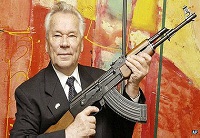
توقف عدد من الصحف البريطانية الصادرة يوم الثلاثاء 14-1-2014 عند الخطاب العاطفي المطول الذي كتبه ميخائيل كلاشنيكوف، مصمم البندقية إيه كي-47، (الشهيرة باسمه في الشرق الأوسط) إلى رأس الكنيسة الأرثوذكسية قبيل وفاته للتعبير عن مخاوفه بسبب إحساسه بالذنب لمقتل الكثير من الناس بسبب بندقيته.

ووضعت صحيفة الإندبندنت صورة كلاشنيكوف حاملاً بندقيته في صدر صفحتها الأولى، وفوقها مقتطفات من رسالته يقول فيها:
"إن ألمي النفسي لا يحتمل. وما زال يراودني السؤال نفسه الذي لا حل له: إن كانت بندقيتي أودت بحياة أناس، فهل يمكن أن أكون مذنبا بسبب موت هؤلاء الناس؟".
وكانت صحيفة إزفيستيا اليومية الروسية كشفت عن أن مصمم بندقية الكلاشنيكوف، الذي توفي في ديسمبر/كانون الأول الماضي عن 94 عاماً، قد كتب رسالة مطولة في أبريل/نيسان إلى أسقف الكنيسة الأورثوذكسية ونشرت نص الرسالة.
Revealed: The dying remorse of Mikhail Kalashnikov, the man who made 100m rifles
“What shall it profit a man,” asks the New Testament, “to gain the whole world and lose his soul?”
It’s a question that seems to have haunted Mikhail Kalashnikov, inventor of the AK-47 assault rifle, as he pondered the fate of his own soul towards the end of his life – despite his public protestations to the contrary.
He may have made little money from the wildly successful weapon of choice for the world’s revolutionaries, drug cartels, terrorists, kidnappers, pirates and soldiers, saying once he would have been better off making a lawn mower. But he was feted by the Russian Motherland for whom it was developed towards the end of World War II and perfected in 1947, the year for which the Avtomat Kalashnikova is named. His awards from the Soviet authorities included the Order of Lenin and the Hero of Socialist Labour.
Now, however, it has emerged that Mr Kalashnikov was suffering “spiritual pain” at the thought of the slaughter his invention had wrought, and the “devilish desires of envy, greed and aggression” his assault rifle fed. You wouldn’t guess that from the photographs that accompanied stories of his death aged 94 on 23 December. In them Kalashnikov stands proudly – even defiantly – brandishing the invention which will carry his name through the ages.
It is a sublime piece of engineering; like all design classics it fulfils its function with grace and simplicity, and is easy to copy – one of the reasons Kalashnikov made so little money. There is no way of knowing how many people – from the drug wars of Mexico to the slaughter in Syria, the bloodshed of Africa’s civil wars or the years of strife in the Middle East – the AK-47 has cut down. But with an estimated 100 million sold, it is fair to assume tens of millions can thank Kalashnikov for cutting their lives short.
“My aim was to create armaments to protect the borders of my motherland,” Mr Kalashnikov once protested. “It is not my fault that the Kalashnikov was used in many troubled places. I think the policies of these countries are to blame, not the designers.”
Now we know he may have been protesting too much. It has emerged that as he neared the end, the ghosts of those killed crept up on him.
In a letter to the head of the Russian Orthodox Church, Patriarch Kirill, in May 2012, Mr Kalashnikov said he was in “spiritual pain” over the number of deaths his invention may have been responsible for, and revealed that he had first gone to church at the age of 91, and had himself baptised.
In the letter, published by the pro-Kremlin Izvestia newspaper, Mr Kalashnikov wrote: “My spiritual pain is unbearable. I keep having the same unsolved question: if my rifle claimed people’s lives, then can it be that I... a Christian and an Orthodox believer, was to blame for their deaths? The longer I live the more this question drills itself into my brain and the more I wonder why the Lord allowed man to have the devilish desires of envy, greed and aggression”.
Mr Kalashnikov is not the first innocent tool of a darker force. It was Robert Oppenheimer, one of the brilliant scientists involved in developing the atomic bomb, who famously said that while watching the Trinity test explosion in New Mexico in 1945 that the lines from the Hindu holy book the Bhagavad Gita occurred to him: “I am become death, the destroyer of worlds.”
The Pandora’s Box of nuclear destruction was opened in the urgency of World War II and the fear that Hitler was lifting the lid. But the impossibility of closing it again, and the fear of what it could lead to, compelled Oppenheimer and his colleagues such as Albert Einstein, to found the World of Academy of Art and Sciences, which promotes public awareness of the consequences of scientific advancement.
Among the founders was also Joseph Rotblat, a Polish scientist who became a leading proponent of nuclear disarmament. Mr Rotblat co-founded the Pugwash Conferences in 1957 with Bertrand Russell which brought together public figures so they could work towards avoiding armed conflict. In 1995 the Conferences, and Rotblat were awarded the Nobel Peace Prize.
That prize was founded by another merchant of death who lived long enough to be horrified at the destruction his invention had wrought. Alfred Nobel, a Swedish chemist, had invented dynamite. Mr Nobel left the bulk of his vast fortune to the establishment of the annual prizes for Physics, Chemistry, Physiology or Medicine, Literature, and Peace.
Who knows if that played in his favour at the final judgement. Kalashnikov, however, seems to be off the hook.
Cyril Alexander Volkov, the press secretary for the Russian Patriarch, said that Kirill had replied to the engineer.
“The Church has a very definite position: when weapons serve to protect the Fatherland, the Church supports both its creators and the soldiers who use it,” he said.
بتوقيت بيروت